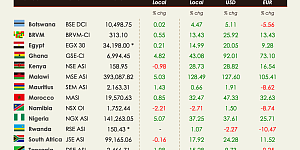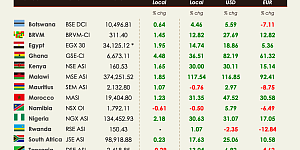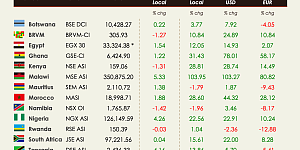The EGX30 is the worst performer of the week. The index lost 3.15% with most of the losses being seen on Thursday following news and rumours of the re-application of the capital gains tax on EGX trades. On Wednesday, the IMF declared that Egypt would start implementing the capital gains tax on its bourse in a period not exceeding the fiscal year 2017-2018. However, the next day the EGX announced that it was bound to the Higher Council for Investment's decision to suspend the tax for a three-year period.
In Malawi political tension is intensifying following last week’s closure of the Times Media Group by Malawi Revenue Authority officials and police. This follows a series of article published by the Media house since November accusing current regime of a supposedly shady deal which involves the purchase by the state-owned Agriculture Development and Marketing Corporation (Admarc) 100,000 tonnes of maize from Zambia in a government-to-government deal. Local media report that the transaction was not an inter-government contract and was, in fact, signed with a private Zambian company called Kaloswe Commuter and Courier Ltd. As additional accusations of over-payment and corruption were made Mutharika government has decided to repress. The refusal to act against corruption sends the wrong signal in an economy which GDP has been weakening following two years of drought. The MSE ASI lost 1.01%.
The NSE ASI gained 0.08% this week. The NSE has shown poor performance year-to-date as investors have been cautious amid volatility concerns. According to the chief executive of the NSE: "Foreigners are waiting for better prices and are picking stocks at fairly low prices and this has dragged the index downwards, especially given that when the stocks that really drive volume -- which are the telcos and the banking sector -- fall, they drag the index down." Truth is the NSE has been on a bearish path since mid-2015 and with the General Election on the horizon, concerns may still weigh on the index near-term. In the meantime, Citigroup, Standard Bank, Standard Chartered and Rand Merchant Bank have been mandated by the Kenyan government to raise $800 mn in syndicated loans. The country intends to raise 154 bn shillings ($1.5 billion) through external borrowing in the current budget year that ends June 30. Kenya’s financing gap for this year is forecasted to be 9.6% of its GDP by the World Bank.
The ZSE Ind. lost 0.82%. Delta, the index’s largest cap and biggest value driver, published its quarterly trading update this week. The Company reported a 10% revenue decline due to a deceleration in lager volumes despite the festive season, which is usually its peak season. The Company reported that operations suffered from a lack of water at some of its depots as well as grey imports, which typically cost less. The revenue decline may continue to put further pressure on Delta’s full year margins which already decreased to 17.93% from 18.21% in Q2. In the meantime, Finance and Economic Development Minister Chinamasa reiterated this week Government's commitment to develop measures to make Zimbabwe an attractive investment destination for both domestic and foreign investors. Minister Chinamasa even stated that they were ready to revise investment laws to stimulate inflows in the country.










































